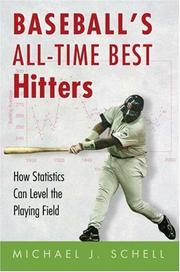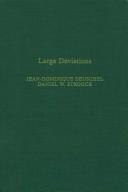| Listing 1 - 4 of 4 |
Sort by
|

ISBN: 0691004552 1400850630 9781400850631 0691123438 9780691123431 9780691004556 Year: 1999 Publisher: Princeton, New Jersey ; West Sussex, England : Princeton University Press,
Abstract | Keywords | Export | Availability | Bookmark
 Loading...
Loading...Choose an application
- Reference Manager
- EndNote
- RefWorks (Direct export to RefWorks)
Tony Gwynn is the greatest hitter in the history of baseball. That's the conclusion of this engaging and provocative analysis of baseball's all-time best hitters. Michael Schell challenges the traditional list of all-time hitters, which places Ty Cobb first, Gwynn 16th, and includes just 8 players whose prime came after 1960. Schell argues that the raw batting averages used as the list's basis should be adjusted to take into account that hitters played in different eras, with different rules, and in different ballparks. He makes those adjustments and produces a new list of the best 100 hitters that will spark debate among baseball fans and statisticians everywhere. Schell combines the two qualifications essential for a book like this. He is a professional statistician--applying his skills to cancer research--and he has an encyclopedic knowledge of baseball. He has wondered how to rank hitters since he was a boy growing up as a passionate Cincinnati Reds fan. Over the years, he has analyzed the most important factors, including the relative difficulty of hitting in different ballparks, the length of hitters' careers, the talent pool that players are drawn from, and changes in the game that raised or lowered major-league batting averages (the introduction of the designated hitter and changes in the height and location of the pitcher's mound, for example). Schell's study finally levels the playing field, giving new credit to hitters who played in adverse conditions and downgrading others who faced fewer obstacles. His final ranking of players differs dramatically from the traditional list. Gwynn, for example, bumps Cobb to 2nd place, Rod Carew rises from 28th to 3rd, Babe Ruth drops from 9th to 16th, and Willie Mays comes from off the list to rank 13th. Schell's list also gives relatively more credit to modern players, containing 39 whose best days were after 1960. Using a fun, conversational style, the book presents a feast of stories and statistics about players, ballparks, and teams--all arranged so that calculations can be skipped by general readers but consulted by statisticians eager to follow Schell's methods or introduce their students to such basic concepts as mean, histogram, standard deviation, p-value, and regression. Baseball's All-Time Best Hitters will shake up how baseball fans view the greatest heroes of America's national pastime.
Baseball players --- Batting (Baseball) --- #TELE:SISTA --- 519.21 --- 519.21 Probability theory. Stochastic processes --- Probability theory. Stochastic processes --- Hitting (Baseball) --- Baseball --- Rating of --- Statistics --- Statistics.

ISBN: 0122131509 9780080874579 0080874576 1281763322 9781281763327 9786611763329 6611763325 9780122131509 082182757X Year: 1989 Publisher: Boston : Academic Press,
Abstract | Keywords | Export | Availability | Bookmark
 Loading...
Loading...Choose an application
- Reference Manager
- EndNote
- RefWorks (Direct export to RefWorks)
Large deviations
Probability theory --- Large deviations. --- Limit theorems (Probability theory) --- 519.21 --- 519.22 --- Large deviations --- Deviations, Large --- Statistics --- 519.22 Statistical theory. Statistical models. Mathematical statistics in general --- Statistical theory. Statistical models. Mathematical statistics in general --- 519.21 Probability theory. Stochastic processes --- Probability theory. Stochastic processes --- Probabilities
Book
Abstract | Keywords | Export | Availability | Bookmark
 Loading...
Loading...Choose an application
- Reference Manager
- EndNote
- RefWorks (Direct export to RefWorks)
Het derde deel in de Zebra-reeks gaat over schatten. Hoe kun je bijvoorbeeld op een slimme manier het aantal bezoekers van een popconcert schatten? Dit boekje laat drie mogelijkheden zien, en laat bovendien zien welke van de drie methodes de beste is, dat wil zeggen: welke het meest betrouwbaar is. Schattingen als deze werden al in de Tweede Wereldoorlog gebruikt bij de Slag om Engeland, in een poging het aantal Duitse vliegtuigen te achterhalen. Verder wordt in dit deel aandacht besteed aan steekproeven en aan de eisen waaraan een goede steekproef moet voldoen. tenslotte wordt in een appendix een aantal begrippen wiskundig wat meer onderbouwd. Dit bijzonder leesbare boekje geeft een duidelijk beeld van de valkuilen die in steekproeven verborgen zitten, en vooral hoe die te vermijden!
519.21 --- wiskunde --- 485.3 --- 51 <075> --- Schattingen --- Wiskunde --- 510 --- Schatten (wiskunde) --- 103481.jpg --- Schatten --- Probability theory. Stochastic processes --- didactiek secundair onderwijs - wiskunde --- Mathematics--Schoolboeken --- 51 <075> Mathematics--Schoolboeken --- 519.21 Probability theory. Stochastic processes --- Secundair onderwijs --- Statistiek --- Steekproeven --- (zie ook: realistische wiskunde) --- statistiek --- Probability theory --- Didactics of mathematics
Book
ISBN: 3540097414 0387097414 0387108602 0387115471 0387119876 0387138978 0387152032 0387164413 0387505490 3540073965 3540078584 3540089381 3540108602 3540115471 3540119876 3540138978 3540152032 3540164413 3540505490 1489984372 9786612839382 0387097422 1282839381 0387073965 9780387073965 9783540073963 9783540097419 9780387097411 9780387164410 9783540164418 9780387138978 9783540138976 3540397817 3540391096 3540385673 3540376003 3540097422 9783540097426 Year: 1975 Volume: 480 Publisher: Berlin: Springer,
Abstract | Keywords | Export | Availability | Bookmark
 Loading...
Loading...Choose an application
- Reference Manager
- EndNote
- RefWorks (Direct export to RefWorks)
For too many students, mathematics consists of facts in a vacuum, to be memorized because the instructor says so, and to be forgotten when the course of study is completed. In this all-too-common scenario, young learners often miss the chance to develop skills—specifically, reasoning skills—that can serve them for a lifetime. The elegant pages of Teaching Mathematical Reasoning in Secondary School Classrooms propose a more positive solution by presenting a reasoning- and discussion-based approach to teaching mathematics, emphasizing the connections between ideas, or why math works. The teachers whose work forms the basis of the book create a powerful record of methods, interactions, and decisions (including dealing with challenges and impasses) involving this elusive topic. And because this approach shifts the locus of authority from the instructor to mathematics itself, students gain a system of knowledge that they can apply not only to discrete tasks relating to numbers, but also to the larger world of people and the humanities. A sampling of the topics covered: Whole-class discussion methods for teaching mathematics reasoning. Learning mathematical reasoning through tasks. Teaching mathematics using the five strands. Classroom strategies for promoting mathematical reasoning. Maximizing student contributions in the classroom. Overcoming student resistance to mathematical conversations. Teaching Mathematical Reasoning in Secondary School Classrooms makes a wealth of cutting-edge strategies available to mathematics teachers and teacher educators. This book is an invaluable resource for researchers in mathematics and curriculum reform and of great interest to teacher educators and teachers.
Probabilities --- Stochastic processes --- Addresses, essays, lectures --- Logic, Symbolic and mathematical --- Mathematics --- Signs and symbols --- Signs and symbols. --- Study and teaching (Secondary). --- Juvenile literature. --- Logic, Symbolic and mathematical. --- Study and teaching (Secondary) --- Probability theory --- 51 --- 51 Mathematics --- 519.2 --- 519.2 Probability. Mathematical statistics --- Probability. Mathematical statistics --- 519.21 <063> --- 519.21 <063> Probability theory. Stochastic processes--Congressen --- Probability theory. Stochastic processes--Congressen --- Mathematics. --- Curriculum planning. --- Mathematics Education. --- Teaching and Teacher Education. --- Learning & Instruction. --- Curriculum Studies. --- Education, general. --- Curriculum development --- Education --- Instructional systems --- Planning --- Math --- Science --- Curricula --- Design --- Geometry, Differential --- Mathematical physics --- Congresses. --- Gaussian processes --- Population --- Congresses --- Statistical methods --- Gaussian processes. --- Probabilities. --- Stochastic processes. --- Statistical methods. --- Percolation (Statistical physics). --- Schrödinger operator. --- Stochastic partial differential equations. --- Mathematics—Study and teaching . --- Teaching. --- Learning. --- Instruction. --- Curriculums (Courses of study). --- Education—Curricula. --- Education. --- Children --- Education, Primitive --- Education of children --- Human resource development --- Instruction --- Pedagogy --- Schooling --- Students --- Youth --- Civilization --- Learning and scholarship --- Mental discipline --- Schools --- Teaching --- Training --- Core curriculum --- Courses of study --- Curricula (Courses of study) --- Curriculums (Courses of study) --- Study, Courses of --- Learning process --- Comprehension --- Didactics --- School teaching --- Schoolteaching --- Pedagogical content knowledge --- Probabilités. --- Géometrie différentielle --- Geometry --- Probabilities - Congresses --- Stochastic processes - Congresses --- Gaussian processes - Congresses --- Population - Statistical methods - Congresses --- Teachers --- Learning, Psychology of. --- Instructional Psychology. --- Study and teaching . --- Training of. --- Curricula. --- Learning --- Psychology of learning --- Educational psychology --- Learning ability --- Teacher education --- Teacher training --- Teachers, Training of --- Psychological aspects --- Probabilités.
| Listing 1 - 4 of 4 |
Sort by
|

 Search
Search Feedback
Feedback About UniCat
About UniCat  Help
Help News
News